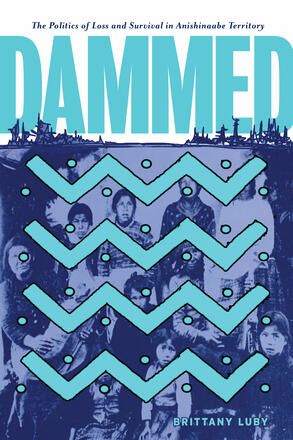
Description
"Dammed: The Politics of Loss and Survival in Anishinaabe Territory" explores Canada’s hydroelectric boom in the Lake of the Woods area. It complicates narratives of increasing affluence in postwar Canada, revealing that the inverse was true for Indigenous communities along the Winnipeg River.
"Dammed" makes clear that hydroelectric generating stations were designed to serve settler populations. Governments and developers excluded the Anishinabeg from planning and operations and failed to consider how power production might influence the health and economy of their communities. By so doing, Canada and Ontario thwarted a future
that aligned with the terms of treaty, a future in which both settlers and the Anishinabeg might thrive in shared territories.
The same hydroelectric development that powered settler communities flooded manomin fields, washed away roads, and compromised fish populations. Anishinaabe families responded creatively to manage the government-sanctioned environmental change and survive the resulting economic loss. Luby reveals these responses to dam development,
inviting readers to consider how resistance might be expressed by individuals and families, and across gendered and generational lines.
Luby weaves text, testimony, and experience together, grounding this historical work in the territory of her paternal ancestors, lands she calls home. With evidence drawn from archival material, oral history, and environmental observation, "Dammed" invites readers to confront Canadian colonialism in the twentieth century.
Reviews
"Luby proves that small dams can have big histories and, in doing so, makes a major contribution to Canadian Indigenous and settler colonial history as well as engaged community research."
- Daniel Macfarlane
“The book belies the settler mythology of progress and growth, especially after the Second World War, and the colonial binary of settler expansion/Indigenous victimization. The people [Luby] features in her book demonstrate resilience in the face of challenge, which is a point to be emphasized and extolled.”
- Jean L. Manore
“In Dammed: The Politics of Loss and Survival in Anishinaabe Territory, Luby offers a history, based on archival and oral resources, of the damming and transformation of the Winnipeg River system, all to the detriment of Indigenous people. A history of race, class, gender and labour, Dammed is also a compelling argument for an increased ability to think in systems and to think deeply about how a pathway to reconciliation needs to be bathed in historical reciprocity.”
- Matt Henderson
"Luby presents the reader with an erudite, but eminently readable, account of the last hundred or so years of human interaction with, and manipulation of, the waterways of Northwestern Ontario… weaving together archival material with Indigenous knowledge and perspectives in an accessible and compelling way."
- Sarah Moar
"Brittany Luby’s Dammed is an important book that pushes the reader to question Canada's nation-building process and to reconcile with the fact that Canada's growth and prosperity were at the expense of Indigenous peoples – with the experience of the Anishinaabeg along the Winnipeg River, and Luby’s home territory, being the example focused upon."
- Chadwick Cowie